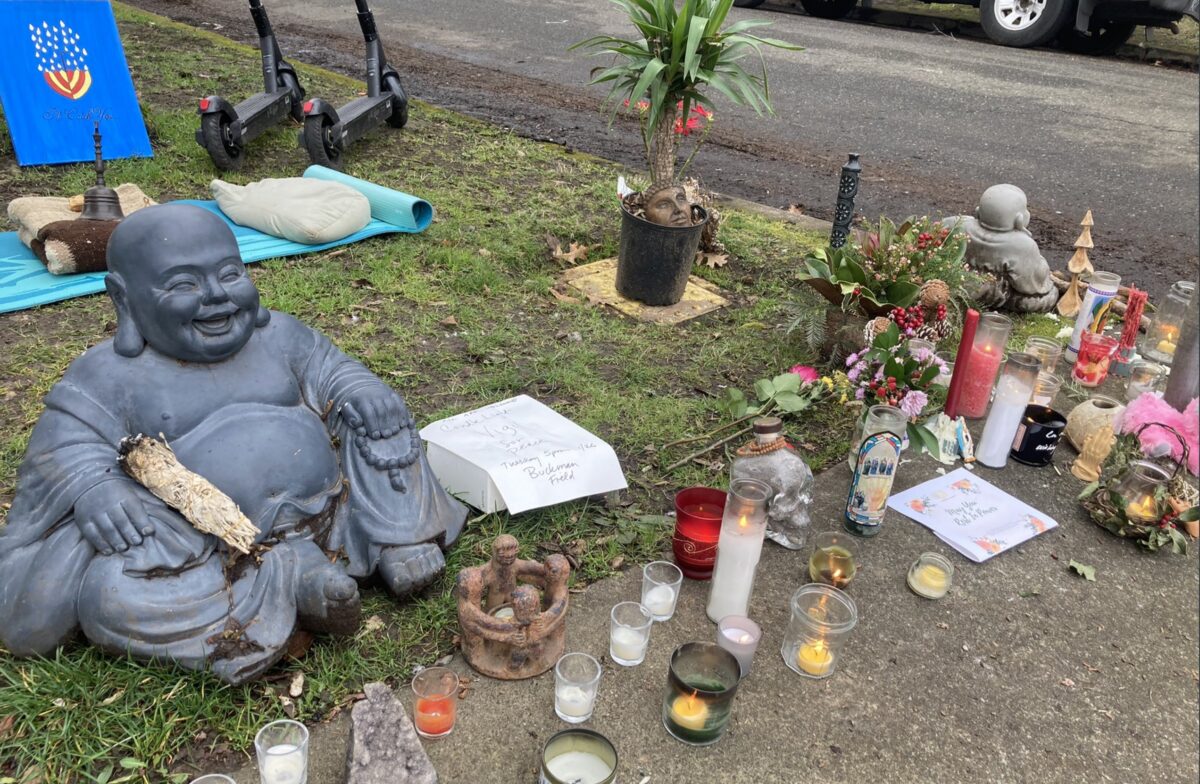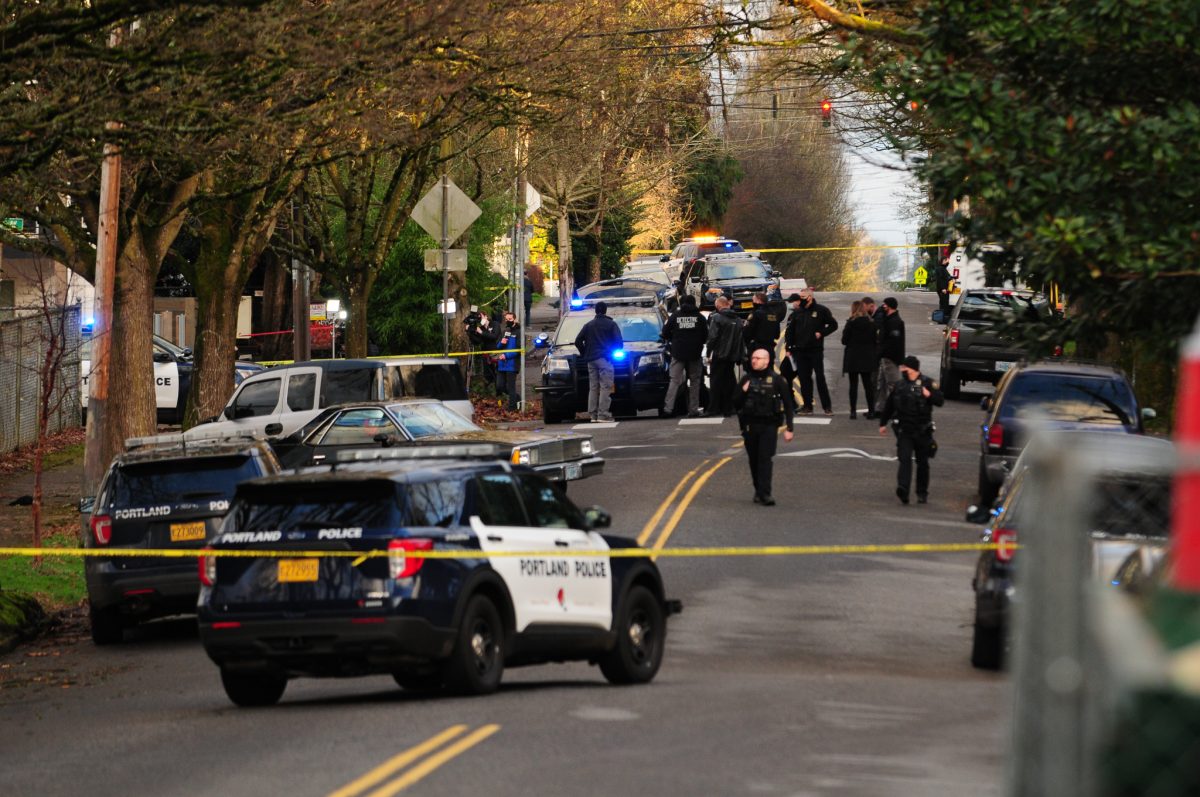
(Photo: Sarah Mirk)
A man behind the wheel of a four-wheeled weapon raged through southeast Portland less than 24 hours ago. Many details remain unknown, but the underlying issues that led to yesterday’s tragedy are all too familiar.
The man who drove that silver Honda SUV didn’t kill, injure, and frighten “pedestrians” and “cyclists”. He did this to Portlanders — people with names and families and friends who should never be minimized to a convenient and narrow label so others can file it away as something that doesn’t impact them.
Some call what happened an “accident” (it wasn’t), many others are shocked. While it’s certainly shocking someone would do something so horrible to innocent people; it is not an aberration. Nor should it come as a surprise — at least not to those of us who’ve been paying attention to our broken traffic culture and those who enable and exploit it. We’ve seen this behavior before. I’m afraid it will continue until we all understand and embrace our role in what caused it, then do the work it takes to change.
Advertisement
The suspect, who reportedly showed no remorse for his actions and was fully aware of what he did, shouldn’t be seen as a deranged monster. His actions are a natural evolution of a culture that doesn’t value human life on either side of the windshield and thinks it’s acceptable to act like you don’t.
We’ve been warning the community to take traffic violence seriously for many years now. I’m afraid it still hasn’t sunk in.
Remember back in 2006 when hosts of a popular local sports radio show promoted hatred and violence toward people on bikes? One of them said she carries bottles of water to throw at people outside her car. Another said, “If you are a cyclist you should know I exist, that I don’t care about you. That I don’t care about your life.” BikePortland was the only media outlet to take that seriously from the outset and we hounded the radio station until the host responded and the program manager apologized.
In 2017, following a spate of injuries, deaths, and damage from reckless drivers, I wrote an editorial that included, “The motor vehicle menace is out of control. Large steel vehicles and people inside them imbued with a feeling of invincibility fueled by a pervasive culture of selfishness and speed mixed with a systemic acceptance of its consequences has led to nothing short of chaos in our streets.”
Ten months later a man intentionally drove his car up onto a sidewalk on the downtown campus of Portland State University and plowed through several people, causing serious injuries.
Later that same year we reported on Todd Foulk, the former owner and producer of Portland Fashion Week, who said he believed the way to respond to people protesting in the street is to, “drive right thru killing as many as who will stand in my way.” There was also Hawthorne Cutlery owner David Rappoport, who wrote in an email to the Hawthorne Blvd Business Association list that, “Sometimes running over bicyclists and pedestrians is the only way they’ll learn.”
Advertisement

(Photo: Jonathan Maus/BikePortland)
This past summer traffic violence became a regular occurrence. In June a Portland Police Bureau office drove recklessly through a crowd of people on the street during a protest. A few weeks later someone violently revved their engine and sped through a peaceful group bike ride in northeast Portland. Six days after that we reported on a City of Gresham employee who put an “All Live Splatter” sticker on their truck. These are just a few of the many vehicular assaults that took place.
Despite all this, too many leaders still don’t think we can do anything about it. Or even worse, they just ignore it. I’m afraid that’s a recipe for more tragedy.
In 2019, an advocate with The Street Trust mentioned the term “traffic violence” during testimony about a speed limit bill in Salem. One of the co-chairs of the Joint Committee on Transportation bristled at the mere mention of it and seemed to have trouble acknowledging that someone would intentionally use their vehicle to commit violence.
When Trump supporters used their vehicles to violently drive through downtown Portland streets in August, Mayor Ted Wheeler and Police Chief Lovell had an opportunity to fortify our streets against the threat and denounce the behaviors. They failed on both accounts. “There was no indignation about people spraying mace or attempting to run over innocent people,” I wrote at the time.
Just last week I shared how our transportation bureau has not fully acknowledged the traffic violence problem or their potential role in addressing it. In response to a tragic 2020 that saw a record-level of traffic deaths and a big spike in reckless driving, the Portland Bureau of Transportation shirked an opportunity to show resolve and commitment to taking back our streets. This continues an unfortunate trend at PBOT.
In 2016, following the killing of Fallon Smart on Hawthorne Blvd by a reckless driver, former PBOT Director Leah Treat told The Oregonian, “I don’t know if there is anything anybody could have done to have prevented that fatality except for the driver… I don’t know how Vision Zero is going to address that kind of fatality.”
This casual acceptance of vehicular violence and recklessness as a random occurrence we can’t do anything about is unacceptable and must change. I’m afraid more people will die if we don’t.
Our enforcement policies need to be better at flagging high-risk drivers. Our mental and public health services need to find at-risk people and give them more support. Our transportation agencies need to fortify our streets by adding more concrete and protected spaces wherever and whenever possible. Our community needs to call out traffic violence in every form, every time; whether it’s spoken, typed, or acted upon.
I’m afraid of how we’re handling this issue; but I refuse to be afraid of our streets. So many times this past year we saw the power streets have to unite us. “Whose streets? Our streets!” isn’t just a chant, it’s an acknowledgment that we all own a piece of the responsibility to keep them safe.
— Jonathan Maus: (503) 706-8804, @jonathan_maus on Twitter and jonathan@bikeportland.org
— Get our headlines delivered to your inbox.
— Support this independent community media outlet with a one-time contribution or monthly subscription.

